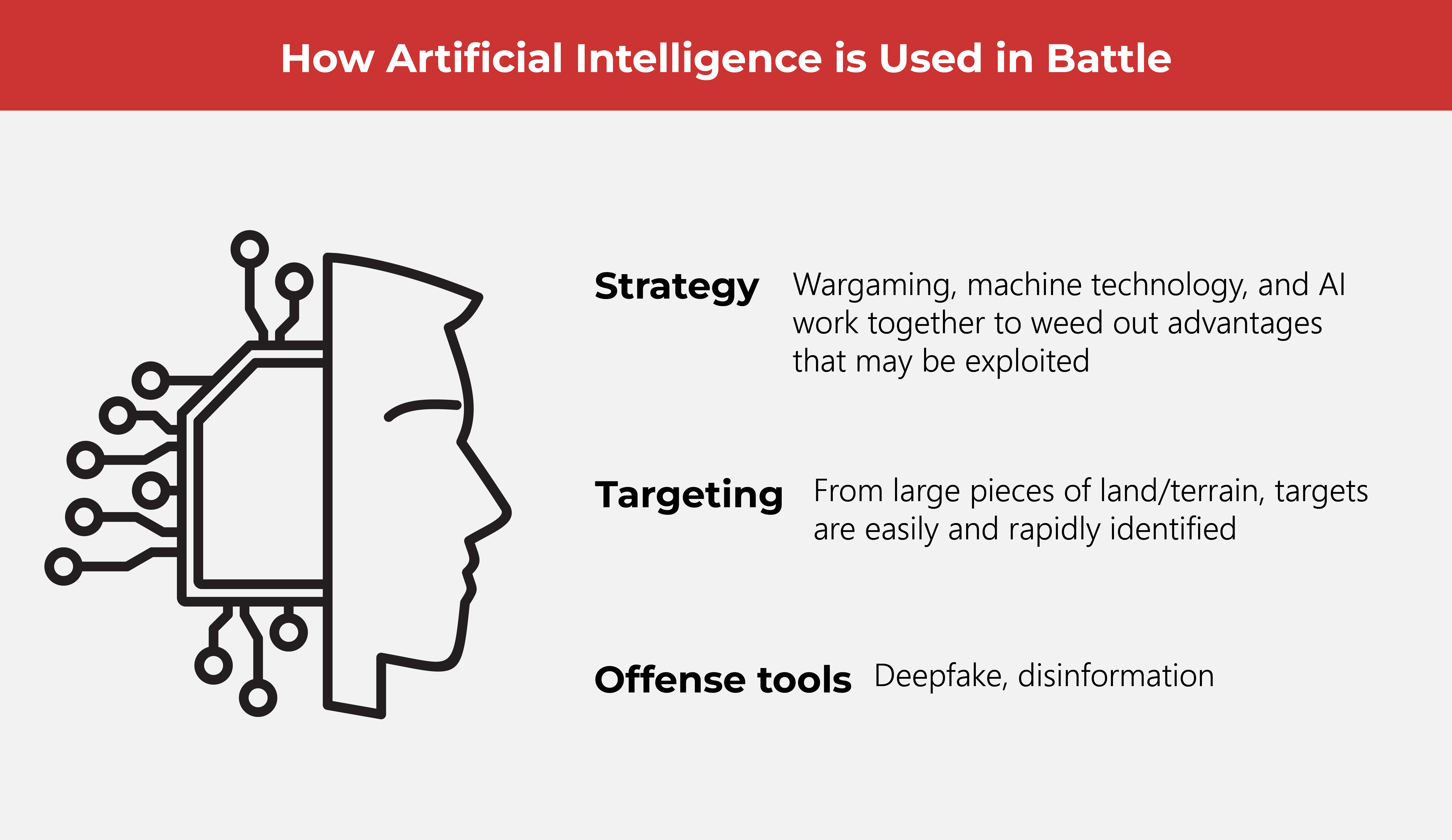How AI Will Win Wars

Nobody wants a war to break out, but when it comes to matters of national defense, the instruments being used and deployed determine who has the dominant hand in tense situations. And the most important instrument? Artificial intelligence.
It almost feels as though the robot wars are finally upon us, but not in the apocalyptic sense (at least not yet). Artificial intelligence and robots have been playing a vital role in military operations for quite some time now, with “intelligentization” being a buzzword for countries vying for recognition as a global superpower.
High-tech weapons are one thing, but the modern military strategy has benefited the most from applying the many technologies related to artificial intelligence. The United States military uses artificial intelligence in many areas of strategic planning, data gathering, training, and developing more sophisticated infrastructure for governance and national defense.
AI has made it possible for the U.S. military to create smarter strategies and use smarter weapons.
For example, artificial intelligence has been instrumental in forming more sophisticated strategies by applying game theory. It has also become vital in fighting wars remotely in areas where there is no longer a strong U.S. military presence. The U.S. military can do this through artificial intelligence (AI) and Internet of Things (IoT) technologies.
(Read Also: New Weapons for New Wars)

AI in strategy
All games are small wars, and some see war as a tremendous game. Within a game are hidden games, and within those hidden games are secrets that can lead a player to victory or defeat. That’s what the research group at Northrop Grumman in charge of a U.S. Defense Advanced Research Program (DARPA) is hoping to uncover with “Gamebreaker”.
The name of the war game in Gamebreaker is called “Command”, and the object of “playing” is to seek out any advantages that a potential opponent can use to give themselves an unfair advantage. By fishing out imbalances in the game, the players can “catch their opponents off-guard”, which in turn may be used in real-life military strategy.
Erin Cherry, a project manager working on Gamebreaker says that the combination of AI, wargaming, and game technology has allowed the group to rapidly explore strategies, as well as optimize for tactics selection, fleet composition, and even enumerate mission outcomes. She goes on to say that this will change the way we fight wars, and help explore “strategies, compositions, and orders of battle.”
The influx of data and the speed with which it comes has to be managed by every military leader. Gamebreaker’s findings hope to support command and control by helping them come to better decisions in the heat and urgency of battle.
AI in remote combat
AI is being used in modern combat and target training. A recent military exercise had a Marine Corps F-35 jet drop a live bomb weighing 1,000 pounds over a grid that was derived via AI.
Lt. General Michael E. Kurilla commands the XVIII Airborne Corps, and he says that the corps has been “a leader in the adoption of AI.”
He goes on to explain that AI speeds processes that would normally take days into mere seconds. Identifying targets efficiently is only one example. On the battlefield, time, as well as precision are of the essence, and with AI, the troops become well-armed and well-equipped in high-pressure situations.
Regular target practice and training with the help of AI help prepare the corps for counter-terrorism operations.
AI and the race for dominance
The U.S. is not the only country using AI to bolster military operations. China has also beefed up its policies concerning artificial intelligence in the military. And when it comes to who gets to be number one, it’s anyone’s guess which superpower comes out on top.
Apart from AI, China has its sights set on information communications technology (ICT), IoT, disruptive technology, and others. There’s a race for dominance to lead in terms of innovation and discovering emerging technologies.
According to The Diplomat, Xi Jinping outlined in a work report to China’s People’s Liberation Army (PLA) back in 2017 that they must “accelerate the development of military intelligentization, [and] improve joint operations capabilities and all-domain combat capabilities based on network information systems” so China may fulfill its military objectives.
One chilling aspect that the article notes is that “it is also very likely to see the PLA apply AI to the domain of cognitive warfare, where out-of-the-ordinary tactics such as disinformation, misinformation, influence strategies in propaganda warfare are in use.”
These tactics become prevalent in China, where policies on data privacy are not as stringent as they are in the United States. The use of deep fake applications to manipulate information as well as spread disinformation is a dangerous application of AI technology. This is one good example of how AI can be used as an offensive tool in battle.
Will the robots win?
For now, even as the robot wars are surely upon us, the technology being used is one of our strongest allies as human beings. It only starts to become our enemy when these amazing technologies are used to stifle civil liberties and human rights, so let’s all hope it never comes to that. Heaven forbid it does, and in the event of it happening, one thing will remain to be true. The robots will not be the ones to blame, but humans.
As one of the Top 19 EMS companies in the world, IMI has over 40 years of experience in providing electronics manufacturing and technology solutions.
We are ready to support your business on a global scale.
Our proven technical expertise, worldwide reach, and vast experience in high-growth and emerging markets make us the ideal global manufacturing solutions partner.
Let's work together to build our future today.




